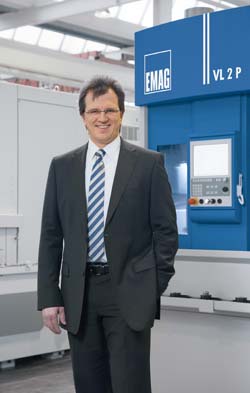“Energy Efficiency Award“: The ZF Group honours EMAG commitment

Dr Guido Hegener, Managing Director <br>EMAG Salach Maschinenfabrik GmbH
From most efficient manufacturing technology to economical design and construction, the machine builders at EMAG have shown their combined, in-depth know-how and experience in one of the most important fields of industrial development, to compete for the “Energy Efficiency Award” from ZF.
The result has convinced the jury at ZF: EMAG’s competition entry under the heading “Energy-efficient Production Machines“ has been honoured as one of the “Top 5 Projects“. In fact, in this particular sector EMAG was the only machine builder so honoured. In the run-up to the competition, and as part of its “Year of Energy“, ZF wrote to approximately 600 of its suppliers, inviting them to participate in the competition.
From 30 eligible entries, the specialists in driveline and chassis technology picked the top five. These five companies were invited to present their particular approach to efficiency on the 13th of September at ZF, Saarbrücken.
EMAG has been focusing on the subject for years
“We are very pleased to have received this award“, declared Dr Guido Hegener, Managing Director of EMAG Salach, Maschinenfabrik GmbH. “It is an incentive for us to continue on the chosen path. Our focus has been on energy efficiency for years.“ During his presentation Herr Hegener pointed out the various development highlights at EMAG:
• The intention to replace less economical processes, such as the classic grinding process, with more energy-efficient manufacturing methods, such as scroll-free turning or hard turning, the energy requirement of which is up to 90 percent less. “Cycle times for these processes are noticeably shorter and the runtime of auxiliary equipment is much reduced. This brings massive energy savings“, explained Herr Hegener.
• On the other hand, EMAG engineers are breaking new ground in the design of manufacturing systems. Within the framework of a collaborative research project, this led to the development of a software package that allows for the energy consumption of machine components and complete systems to be determined already at the development stage, on the computer.
“We have established how much energy each component consumes and where the biggest potential for savings lies“, explained Wolfgang Rummel, Head of Control Technology Development and Design at EMAG Salach Maschinenfabrik GmbH. He also made reference to the concrete measures taken: EMAG includes the most efficient components already in their standard machine design – for instance hydraulic packs of greater efficiency, low-wattage valves and intelligent auto-standby circuitry.
At the end of his competition presentation Director Dr Hegener introduced a new overall objective: the development of the “sustainable factory“. He suggested that in future the production – together with the building in which it is situated and its technological contents – is evaluated as a single entity. In conclusion, he expresses his belief that the measures taken to reclaim and recycle energy can lead to a potential saving of another max 40 percent.
Contact for press and publishers
Oliver Hagenlocher
EMAG Gruppen-Vertriebs- und Service GmbH
Austraße 24
D-73084 Salach
Fon: +49(0)7162/17-267
Fax: +49(0)7162/17-199
e-mail:communications@emag.com
Media Contact
More Information:
http://www.emag.comAll latest news from the category: Awards Funding
Newest articles

Sea slugs inspire highly stretchable biomedical sensor
USC Viterbi School of Engineering researcher Hangbo Zhao presents findings on highly stretchable and customizable microneedles for application in fields including neuroscience, tissue engineering, and wearable bioelectronics. The revolution in…

Twisting and binding matter waves with photons in a cavity
Precisely measuring the energy states of individual atoms has been a historical challenge for physicists due to atomic recoil. When an atom interacts with a photon, the atom “recoils” in…

Nanotubes, nanoparticles, and antibodies detect tiny amounts of fentanyl
New sensor is six orders of magnitude more sensitive than the next best thing. A research team at Pitt led by Alexander Star, a chemistry professor in the Kenneth P. Dietrich…





















